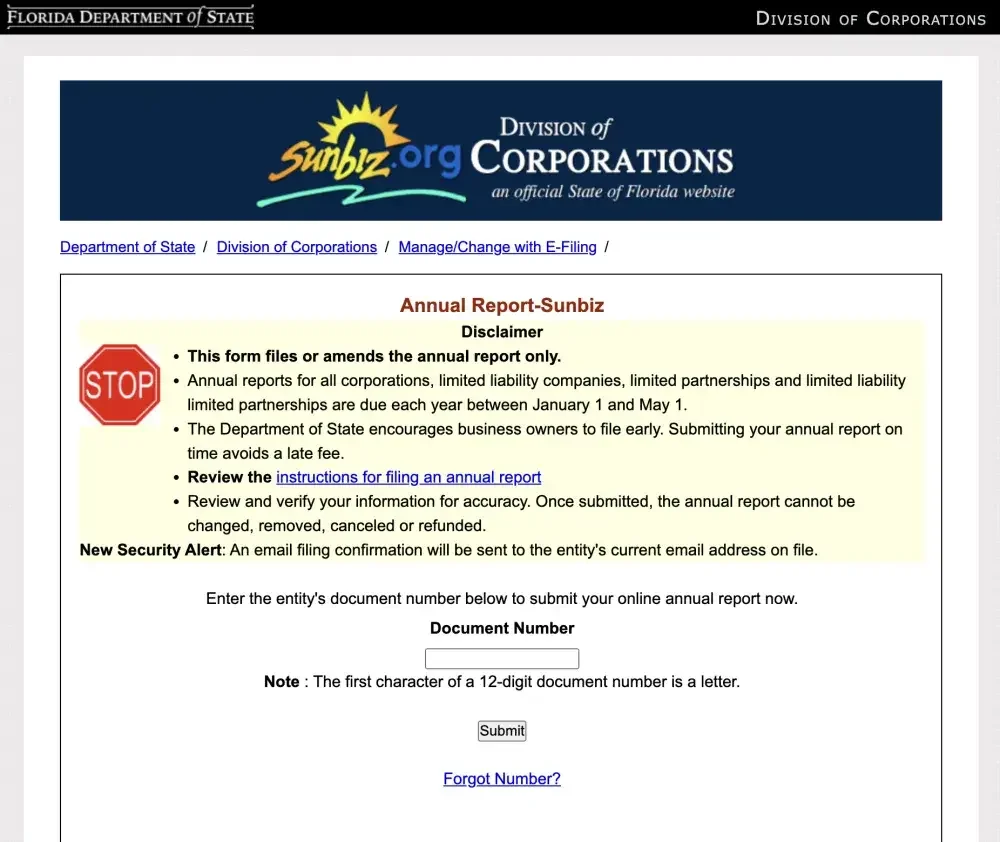Your annual report is a document that must be filed online with the Florida Department of State Division of Corporations every year to provide updated information about your business. Whether you maintain a limited liability company (LLC), corporation, nonprofit, limited partner (LP), or limited liability partnership (LLP), filing an annual report is a requirement for your business to remain active.
Florida continues to raise the bar as the state with the highest new entrepreneurship rate per capita in the United States. This means that the quantity of new business creations in Florida exceeds states throughout the entire country, and for good reason. Florida’s affordability opens doors for business investments, which makes it an attractive option for entrepreneurs.

So, if you’ve decided to jump on the entrepreneurship bandwagon, you should understand the importance of annual reporting to maintain state compliance.
What is an annual report?
An annual report is a document that provides up-to-date information about your business, such as your business name, address, and members. Considering the possibility of changes that may occur throughout the business year—like member information or your business address—it’s necessary to keep records up to date for state compliance.
Moreover, an annual report is your ticket to keep your business active with the Florida Department of State. Mark your calendar, because it’s required in the state of Florida to be completed and filed no later than May 1st every year.
What information must a Florida annual report contain?
Before you get started, here is some information you should gather in order to successfully complete your annual report.
- Florida Department of State document number (the unique ID number given to your business by the Division of Corporations)
- Business name
- Business address
- Mailing address
- Federal Employer Identification Number (EIN), if you have one
- Florida registered agent name, address, and signature
- Name/address of at least one principal associated with the business such as an officer, director or manager
- Valid form of payment (credit card, debit card, check, or money order)
Who qualifies as a principal?
A principal in a Florida business is any key individual associated with the business such as an officer, director, partner, manager or member. Typically as a principal, you hold a position that grants you power, authority, and influence as a decision-maker for the company. Typically, officers will carry the positions of the Chief Executive Officer (CEO), Chief Operating Officer (COO), Chief Financial Officer (CFO), President, or General Counsel.
How to file your Florida annual report in 3 steps
Filing your Florida annual report can be accomplished in three steps. In the state of Florida, the annual report can only be completed and submitted online, which offers valuable convenience for busy entrepreneurs. Although you can skip a trip to the Florida Department of State’s office, you must still be prepared to complete your annual report with all of the required information.
Step 1: Gather the necessary information
First, you must gather all of the required information to complete your annual report. This may be the most lengthy part of the process if the required information is not easily accessible or significant changes have been made over the past year. For instance, your document number may not have earned a spot in your filing cabinet; however, this information can be found on your annual report notice or the Florida Department of State Division of Corporations website.
Your document number is mandatory to start or access previously completed annual reports. You will use your entity name to perform your document number search, but keep in mind that entity name changes can not be accomplished through your annual report. If you want to change your entity name, you must submit an Articles of Amendment form.
Additionally, you will provide your federal EIN, if you have one, which is assigned to you after submitting an EIN application to the Internal Revenue Service (IRS). Single-member LLCs are not required to have an EIN and can use the sole member’s Social Security number when filing taxes, but this does not apply when filing your annual report. Thankfully, you can speak with a LegalZoom business advisor for further guidance.
Now is the time to dust off your address book and gather info about your registered agent, senior officers, directors, and principals, including titles, names, addresses, and signatures. This will be your chance to make changes and updates where necessary, including a change in business address or registered agent (note that a business cannot be its own registered agent). However, if your business entity is a limited partnership (LP) or limited liability limited partnership (LLLP), you must file a certificate of amendment to change the general partners on your annual report.
Step 2: Go to the Florida Division of Corporations website
Once you’ve collected all of the vital information, you must go to the Florida Division of Corporations’ website, Sunbiz.org.

Step 3: Complete and submit your report
Lastly, you will fill in the requested information and submit your report. Remember to keep a form of payment nearby, because filing your annual report is not free. (More on that below!)
How to file a Florida annual report with LegalZoom
If you’re worried about filing your Florida annual report and want help avoiding potentially costly mistakes, you can use LegalZoom's annual reporting service. Our attorneys will save you time and money by ensuring you meet all legal obligations and deadlines to avoid late fees. This service starts at $99 + state filing fees, which is invaluable for your peace of mind.
How much does it cost to file an annual report in Florida?
The Florida annual report fee differs depending on the business structure:
- Nonprofit corporation: $61.25
- For-profit corporation: $150.00
- LLC: $138.75
- LP or LLLP: $500.00
When is the deadline to submit a Florida annual report?
The deadline for all Florida annual reports is May 1st. However, you can submit your report as early as January 1st to avoid missing the deadline and incurring a late fee.
What are the penalties for not filing an annual report in Florida?
All annual reports filed after May 1st will require a late fee of $400. However, if your report is not filed no later than the third Friday of September, your business will be administratively dissolved.
Do all business entities need to file an annual report in Florida?
All business entities in Florida—including corporations, nonprofit corporations, limited liability companies, limited partnerships (LPs), and limited liability partnerships (LLPs)—must file an annual report. By filing an annual report, you maintain a level of transparency and accountability within the state and the general public while upholding state regulations.
What is the Florida state franchise tax?
The Florida state franchise tax is also known as the “privilege tax” because it grants corporations the privilege of conducting business in the state of Florida and gives the opportunity to make a profit from their investment. All in-state or out-of-state Florida corporations, banks, associations, and tax-exempt organizations are required to pay a state franchise tax.
If you've decided to start an LLC in Florida, then you must file a Florida LLC annual report, but you may be exempt from paying corporate taxes if you elect to be taxed as an LLC. However, if you and the members of your LLC elect to be taxed as a corporation with the IRS, then you will be expected to pay the franchise tax. In other words, you will be taxed as a corporation.
FAQs
Can you submit an annual report early?
The earliest you can submit your annual report is January 1st. Due to the complexity and time it may require to complete, it’s highly recommended to begin the process as early as possible to avoid missing the annual report deadline.
How can you pay the Florida franchise tax?
You can pay for your Florida franchise tax electronically in two ways. Depending on preferences, you can use the IRS Modernized e-File (MeF) program, which is a software vendor that has been approved by the Florida Department of Revenue to assist with electronic filing and payments.
You can also file and pay directly with the Florida Department of Revenue by enrolling in e-File and e-Pay to utilize the Department of Revenue electronic filing services available on the website.
Can you file an annual report by mail?
No. You must file your Florida annual report online using the Florida Department of State’s Sunbiz.org website. However, you can submit your annual report payment by mail.
Do nonprofit corporations need to file an annual report in Florida?
Yes, nonprofits must file an annual report in order to operate in the state of Florida. Considering the nature of nonprofit organizations that greatly rely on volunteers, donors, and stakeholders, the added transparency provided by an annual report will be in the best interest of the organization, the state, and the general public.


